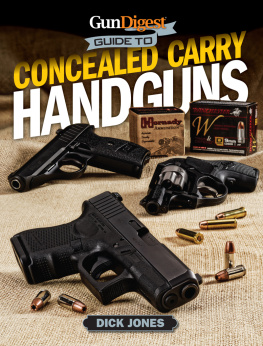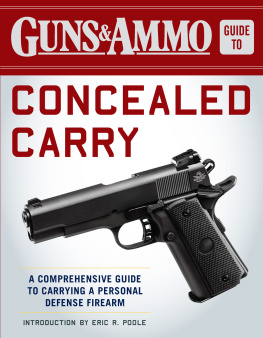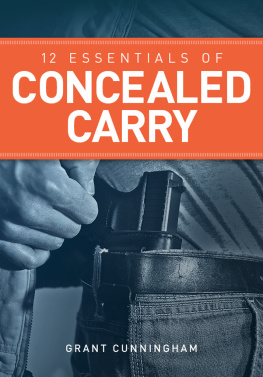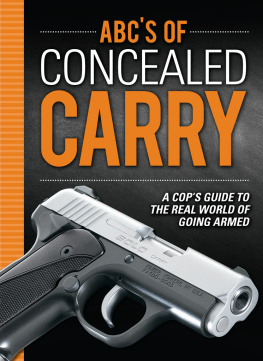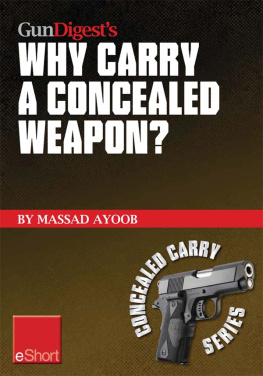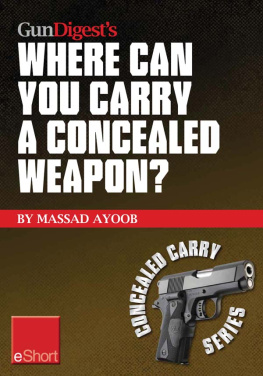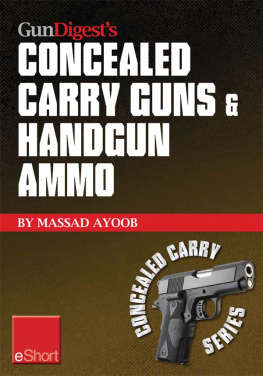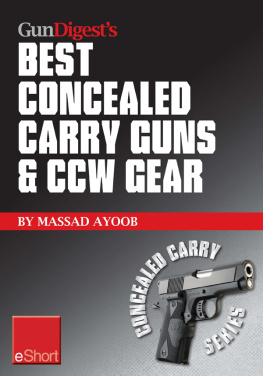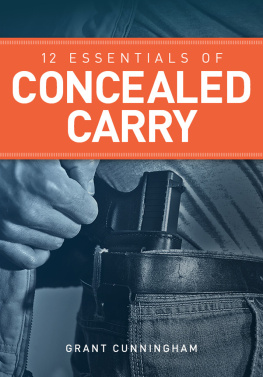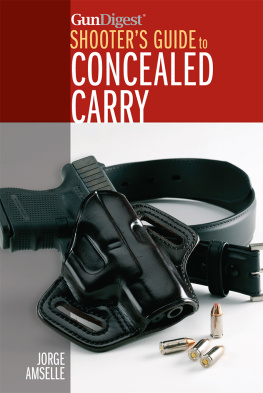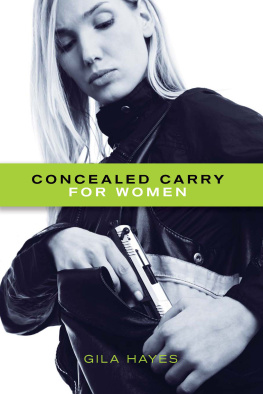Good Guys with Guns
Good Guys with Guns
The Appeal and Consequences of Concealed Carry
ANGELA STROUD
The University of North Carolina Press Chapel Hill
This book was published with the assistance of the Authors Fund of the University of North Carolina Press
2015 The University of North Carolina Press
All rights reserved
Set in Charis and Lato by Westchester Publishing Services
Manufactured in the United States of America
The University of North Carolina Press has been a member of the Green Press Initiative since 2003.
Library of Congress Cataloging-in-Publication Data
Names: Stroud, Angela, author.
Title: Good guys with guns : the appeal and consequences of concealed carry / Angela Stroud.
Description: Chapel Hill : University of North Carolina Press, [2016]|Includes bibliographical references and index.
Identifiers: LCCN 2015041169|ISBN 9781469627892 (pbk : alk. paper)|ISBN 9781469627908 (ebook)
Subjects: LCSH: Concealed carry of firearmsSocial aspectsUnited States.|Firearms ownersUnited StatesAttitudes.|FirearmsSocial aspectsUnited States.|Firearms ownershipUnited States.
Classification: LCC HV7436 .S78 2016|DDC 363.33dc23 LC record available at http://lccn.loc.gov/2015041169
Cover illustration courtesy of Northland College.
The only thing that stops a bad guy with a gun is a good guy with a gun.
Wayne LaPierre, NRA executive vice president
I resumed staring at the gun. It occurred to me that this was the ultimate device for determining ones competence in the world. I bounced it in the palm of my hand, sniffed the steely muzzle. What does it mean to a person, beyond his sense of competence and well-being and personal worth, to carry a lethal weapon, to handle it well, be ready and willing to use it? A concealed lethal weapon. It was a secret, it was a second life, a second self, a dream, a spell, a plot, a delirium.
Don DeLillo, White Noise
Contents
Figures and Table
Figures
Table
Acknowledgments
This research would not have been possible were it not for the generosity of the people who agreed to share their views and experiences with me, especially Bill and Mary, who allowed me into their training courses. Thanks to you all for your time, your honesty, and your trust.
I also appreciate the guidance and critiques offered by Mark Warr, Javier Auyero, David Kirk, and John Hartigan, and for the mentorship of Ben Carrington. I am deeply indebted to Christine Williams for supporting me during this research and in my time as a graduate student at the University of Texas. Those who have had the privilege of working with Christine know that she has extremely high expectations but that she will also help you figure out how to meet them. Christine, your belief in my work was what allowed me to persevere during some very challenging times, and I am sincerely grateful for all of your help, including providing research money that I spent at gun ranges!
The seeds of this research were planted very early, when I was an undergraduate at Southwestern University, and I am forever appreciative of Ed Kain, Dan Hilliard, Shannon Winnubst, and particularly Maria Lowe, who was the first to make me realize that I had a knack for sociology and who continues to support my work. I would also like to acknowledge my late grandparents, Doris and Audie Stroud, who made my attending Southwestern possible.
I would like to recognize my students, who are not only sources of inspiration but often my first audience. The chance to share ideas with you and to learn from you has made me a sharper thinker and a clearer communicator, and your enthusiasm and insights continue to be sources of inspiration. I am grateful to the amazing community of Northland College, a place that I am very lucky to have discovered and that I am happy to call home. My students and colleagues at Northland have pushed me to put social justice at the center of my sociological thinking, and for that I am a better scholar, teacher, and person. Thank you, Kevin Schanning and Les Aldritt, for the support that made finishing this book possible, and to Aby Lints for help with the references. To the amazing Bob Gross: thank you for the beautiful cover (and on such short notice!), and to Brian Mrnak at Sports Hollow in Ashland, Wisconsin, thanks for the cover loaner!
Thank you to my editor Joe Parsons, all of the University of North Carolina Press staff who worked on this book, and the anonymous reviewers who critiqued it. Joe, your diligence and support kept this project moving along even when other life matters threatened to get in the way. Parts of chapters 2 and 4 appear in an article in Gender & Society , and I appreciate the guidance offered by editors Dana Britton and Joya Misra and the reviewers who critiqued that work.
It is impossible to imagine having arrived at this point without my graduate school crew, particularly Cati Connell, Megan Reid, and Corinne Reczek. You three were there in the earliest stages of this process and helped me figure out how to make it all happen. Thank you for the insights, the laughs, and all the love. Thanks to my parents, Michelle Kirby and David Stroud, who have always made me feel that I can do anything and whose unique blend of worldviews is found throughout the pages of this book. Thanks also to my stepdad Joe Kirby for teaching me to shoot and for giving me my first gun. My sisters, Lisa Hyche and Laura ODea, are two of the most important people in my life, and I am very lucky that they have always been in my corner. Thank you to Cynthia Belmont for your brilliant editing, incisive critique, and, most of all, unyielding support in everything. I am the luckiest person in the world.
This book is dedicated to my children, Mackenzie, Maddie, and Ryan, who have always inspired me to do what is right and just even when it is difficult. May you always seek the truth and let love be your guide.
Ive had help along the way, but any mistakes are my own.
Good Guys with Guns
Introduction
I met John at his firearms training school located in a rural part of Central Texas where he and other instructors teach various safety and self-defense courses, from introductory pistol to SWAT tactics. Though I started this project uncertain about why a person would feel the need to carry a firearm in public, by the morning John and I met, I had already heard enough stories about violent assaults and the horror of being helpless when confronted by an armed criminal that I was developing anxiety about the idea of victimization, and I was starting to see the appeal of carrying a handgun. This was happening despite my familiarity with the empirical evidence that clearly showed that violent crime rates were continuing a two-decade-long trend of steep decline and my deep reservations about what it would mean for our society to have an ever-growing cadre of armed citizens. Would we become increasingly suspicious of one another? How would basic social ties be affected? These questions loomed in the background as I interviewed John.
If proponents of concealed handgun licenses (CHLs) could handpick a spokesperson to promote their cause, John would be an excellent candidate. He is smart and articulate and speaks quickly and convincingly about why handgun licensing is effective social policy. For example, he explained that the likelihood of a police officers being around when you need one is virtually zero: It doesnt mean that theyre bad people [or] that their organization is a failure. It means that they have a limited number of officers, and we wouldnt want to live in a country where you have a police officer at your elbow twenty-four hours a day anyway. And most of the police officers would not want to work in an environment like that either. Theyre not interested in that. By definition that means that if youre going to be able to defend yourself against a violent attack from someone that has no justification for attacking you other than greed, malice, sexual, whatever, then, youve pretty much gotta be ready to take care of yourself. He continued, Our joke is, Itll never happen to me is not a self-defense plan. But the vast majority of unarmed people, thats their self-defense plan. They say, Well why do you carry a gun? Nothing bad is ever gonna happen to me. And I say, Well, let me give you some phone numbers. You know, lets talk to people that, yeah, they said that too. Right before something did. Or something happened to somebody they knew.


